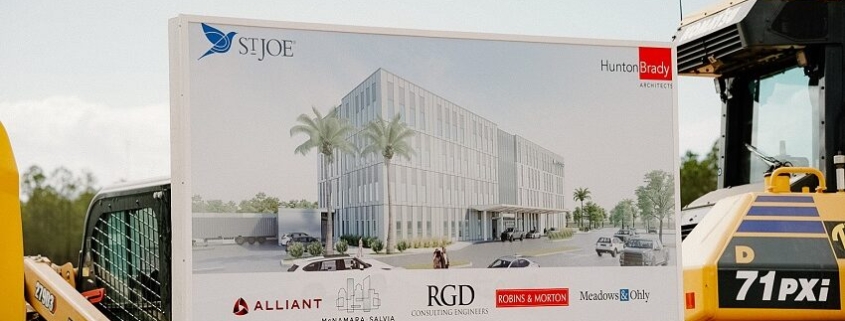The St. Joe Company, Tallahassee Memorial Health Care And Florida State University Break Ground On New HealthCare Campus
The St. Joe Company, Florida State University and Tallahassee Memorial HealthCare celebrated the construction kickoff Tuesday, January 17, 2023 of a health care campus in Panama City Beach that will bring together clinicians, researchers and students to better serve the medical needs of the Florida Panhandle.
The FSU Health-Tallahassee Memorial HealthCare Medical Campus will be located on an 87-acre parcel of land just minutes from the Latitude Margaritaville Watersound community, St. Joe’s 55-plus community that recently sold its 1,000th home.
“Today’s celebration represents a very important step forward for our community,” says Jorge Gonzalez, President and CEO of The St. Joe Company. “This medical campus, backed by the expertise of Tallahassee Memorial HealthCare and Florida State University, is a crucial element for supporting the health and well-being of residents and visitors in every stage of life. It also has the potential to create synergistic opportunities between research, education, and clinical delivery, to enhance quality of life throughout the region and beyond.”
Development plans include an 80,000-square-foot medical office building scheduled to be complete in 2024. This medical office building is planned to ultimately house TMH Physician Partners – Primary Care, Tallahassee Memorial Urgent Care Center, an ambulatory surgery center, as well as cardiology and orthopedic services. Plans include a 100-bed hospital with an emergency center and other inpatient services, including surgery, cardiology procedures and imaging, expected to be completed in 2027.
The project will also include opportunities for FSU researchers focused on aging and digital health, as well as residency programs and educational rotations for FSU medical students.
“Today’s construction kickoff comes at a pivotal time for TMH as we celebrate our 75th anniversary this year,” said Mark O’Bryant, President & CEO of TMH, which serves a 21-county area in North Florida, Georgia and Alabama. “We have grown from a small, city-owned hospital into a comprehensive healthcare system. As the population in our region increases, TMH has identified a substantial need to expand healthcare services. Over the past seven and a half decades, we’ve built a reputation for excellent, compassionate and local care, and we are proud to now offer our services to the Panama City Beach communities.”
Over the past several years, Florida State University has been growing its health research portfolio while also pursuing partnerships with major health care systems such as TMH and others. It’s also increased opportunities for students through its College of Medicine, opening a physician’s assistant training program, and is welcoming the first cohort of its new doctoral program in nursing at the College of Nursing this fall.
“FSU has long enjoyed being a part of this community through our Panama City Campus,” said FSU President Richard McCullough. “Now, we’re looking forward to expanding our presence and continuing to serve the residents here through this health care initiative. Research universities can play an important role in a vibrant health care delivery system, and FSU looks forward to playing that role right here in Bay County. This area is experiencing an incredible boom in population and the possibilities — and needs — have never been greater. There are tremendous opportunities for collaboration on research, education, and clinical health care across the region — and I’m excited that it begins right here with this medical campus.”
The university also plans to break ground on the FSU Health Tallahassee Center on the TMH campus later this year with the support of a $125 million appropriation from the Florida Legislature. Gonzalez, O’Bryant and McCullough were joined at the groundbreaking by U.S. Rep. Neal Dunn, R-FL, and Panama City Beach Mayor Mark Sheldon as well as TMH Vice President and Chief Health Operations Officer Andrew Starr and other local officials from the Bay County area.
The project has generated considerable interest in the Florida Panhandle and throughout the state. Estimates show that Florida will have a shortfall of 4,700 primary care physicians by 2030 and 60,000 nurses by 2035. At the same time, the state is growing. Florida was the fastest growing state last year, with a population growth of 1.9%.
“Because we are a nonprofit, community-based healthcare system, we recognize that TMH is a community asset that drives the health of our region’s residents,” Starr said. “As we grow, we remain dedicated to the sacred trust given to us by our patients to care for them when they need it most. This is why we are developing strategic partnerships throughout the region and investing in the most advanced lifesaving technology. We are building the best-in-class healthcare system our region deserves.”
View photos from the Construction Celebration here.
View a video of the Construction Celebration here.
Source: BusinessWire




